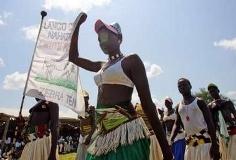FEATURE-Sudanese seek safety in troubled northern Uganda
By Daniel Wallis
ADJUMANI, Uganda, July 17 (Reuters) – After the rebels hacked his mother and father to death in front of him, Moses Taban sought sanctuary in an unlikely place.

|
|
Sudanese refugees sing and dance at Ikafe camp during World Refugee Day celebrations in northwest Uganda near the borders with Sudan and the DR of Congo June 20, 2005.(Reuters). |
For seven days he walked through the thickly wooded hills of southern Sudan until he reached northern Uganda, where the same cult-like group that slaughtered his parents has waged a brutal insurgency for nearly two decades.
It might not seem the safest place to run, but the 22-year-old Sudanese had heard there was a place he could shelter — even if it meant remaining at risk from Lord’s Resistance Army (LRA) fighters he called “chong-chong”, or “chop-chop”.
“I want to stay here. The rebels are very serious back in Sudan,” he told Reuters soon after arriving at a refugee reception centre on the Ugandan banks of the River Nile.
“If they catch you, they make you lie down and they cut you with big knives. If you run, then they shoot you.”
Nineteen years of war in Uganda’s north have uprooted at least 1.6 million villagers in nine districts there and triggered one of the world’s worst and most neglected humanitarian disasters.
But as southern Sudan struggles for peace after its own decades-old civil war, thousands of its people are still being driven into Uganda by hunger, tribal tensions and increasing attacks by LRA rebels hiding in the lawless mountains near the border.
GENEROSITY
Uganda, which already hosts at least 300,000 refugees from eight African nations including neighbouring Rwanda and the Democratic Republic of Congo, has opened its arms to them.
While donors have criticised the government over accusations of human rights abuses and political repression, top aid officials say the welcome it offers so many of the continent’s most desperate should serve as a lesson to the West, where asylum policies are becoming more and more restrictive.
“Uganda is an extraordinary example of generosity,” Antonio Guterres, the new boss of the U.N. refugee agency, said when he visited northern Uganda.
“The international community owes you a lot more support.”
He said Uganda stood in stark contrast to attitudes in rich nations, where he said genuine asylum cases were becoming increasingly muddled with the problems of illegal immigration and terrorism.
Dozens of African conflicts have created more refugees in recent years than anywhere on earth. Millions of them are in Uganda’s Great Lakes region, and normally the victims have no choice but to throw themselves on the mercy of neighbouring countries that are the least-equipped to receive them.
The developing world produces 85 percent of all refugees, but it also provides shelter to about three quarters of them.
The 9,000 Sudanese who have fled to Uganda since the peace deal was signed there in January will be given simple building materials and land to farm alongside local communities.
Supported by the U.N. High Commissioner for Refugees, the same scheme has long been in place in remote rural parts of southern and western Uganda, and many Rwandan and Congolese refugees have stayed in Uganda for years.
“We don’t mind them. They are like our brothers and sisters,” said one local woman carrying water past Sudanese refugees — mostly women and children — waiting to register under trees by the river at Palorinya reception centre.
NO DISCRIMINATION
Like Moses Taban, many of the new arrivals tell harrowing tales.
Bosco Oryam was married with six children, but when LRA fighters surrounded their village in Lakilire, southern Sudan, he had to escape on foot with just one baby boy.
He said he did not know where the rest of his family was.
Some said they feared fresh ethnic violence breaking out as Sudan’s south shares out the spoils of the peace agreement with Khartoum, including millions of dollars in oil revenues.
Others said they had been suffering famine, exacerbated by increasingly frequent LRA attacks there that made it impossible to stay in one place long enough to grow food.
Life will remain hard for the refugees in Uganda. Their living conditions will be more comfortable than in the sprawling camps for the country’s own displaced deeper in the LRA war zone, but many will remain within the rebels’ reach.
The guerrillas, who have never given a clear account of their aims, massacre civilians, kidnap children and cut off the lips and ears of victims to make walking examples of what they will do to government “collaborators”.
Eight thousand Sudanese now living in Uganda’s Yumbe district were first settled at Acholi-pii in Pader district before being moved west three years ago after 60 of them were killed by rebels.
In Uganda’s Adjumani district, across the Nile from Palorinya, 30,000 Sudanese refugees fled their new homes due to LRA raids last year, and more than 45,000 Ugandans were also displaced.
Ugandan officials said that by sheltering the refugees, they were simply returning the favour after many Ugandans fled to southern Sudan during their country’s darkest days in the 1970s under the late dictator Idi Amin.
“We are in harmony. The refugees can stay as long as they like. There is no discrimination here whatsoever,” Nixon Owole, chairman of Adjumani district, told Reuters. “When the LRA attacks, both refugees and nationals suffer alike.”
